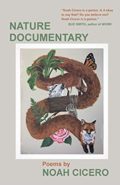
Review: Nature Documentary by Noah Cicero
Reviewed by Tim Lantz

Nature Documentary
Poems by Noah Cicero
House of Vlad Productions, February 2018
Paperback: $10.00; ebook: $2.99; 108 pp.
ISBN: 978-1979791557
A nature documentarian’s goal is to remove the distance between us and another species. In Noah Cicero’s Nature Documentary, that species is us—past, future, unreal, self-fooling. The characters populating these poems suffer for their ability to live only one branch of possibility. Their regret is both cause and consequence of a distorted story of the past, a story that shapes the present by evading it. Cicero’s narrator sees into parallel realities, traveling subjunctive if it were so as easily as indicative it is thus.
In “Halcyon Problems,” for example, an unnamed woman looks at pictures from when she taught English in Korea, when she “woke up excited / to be alive.” She tells herself, “There I am.” However, the narrator breaks in: “According to a local historian, the woman in this poem / didn’t enjoy herself in Korea” and in fact “woke up / most days to dread.”
Similarly, in “Mom in Her 30s,” the titular mother regrets her decisions even as friends and family surround her. Her life has prevented her life, she thinks. “I could be anything. But no, / I’m a mom. A fucking mom.” But these thoughts die as soon as she sees her son chase a ball into the path of a car. She screams for him to stop, an order he obeys, after which she “doesn’t go back to her previous ruminations.” Only the threat of absence can cancel her wish for it.
Cicero’s excellence exists in his one-two of humor and hurt. See, for instance, the poem “The Dinosaurs at the Natural History Museum”: “For sure, the T-Rex ate something bad, / had diarrhea, even got constipated,” followed two stanzas later by
Then another dinosaur
saw you slow moving
and it jumped on your body,
ripping you to shreds.
Or maybe you got trapped
in tar or mud
and slowly
starved to death.
I bet you felt anxiety
in that situation.
This organism’s anxiety catches up with us despite the separation of millions of years, creating a momentary simultaneity. Cicero’s poetry shows the difficulties of being present to another’s suffering. “Even though we are all busy, doing our people thing…,” he writes in his introduction, “out there…are animals and plants, and even people, that have their own priorities.” It’s this attention to private yet shared unease that makes Nature Documentary a relentless act of kindness.
Tim Lantz’s current project is a multigenre, multilingual memoir about meeting his daughter in China. His website is timlantz.com.

Leave a Reply